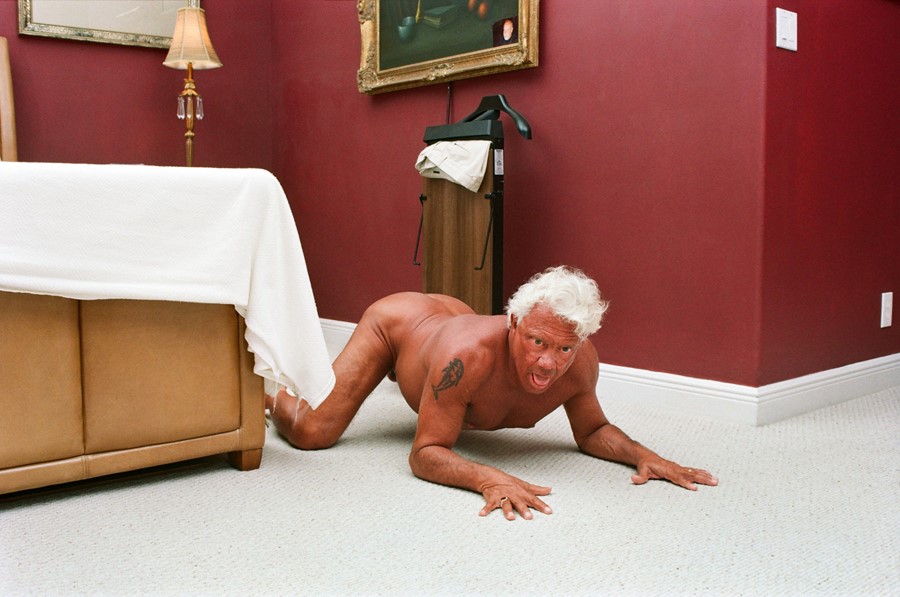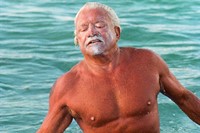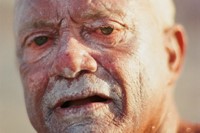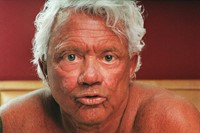Published by Pomegranate Press, Matthew Leifheit’s new photo zine focuses on Frank, an eager exhibitionist from Fort Lauderdale, Florida
Sometime in the summer of 2021, on a nude beach in Miami, Matthew Leifheit looked out to sea and spotted a naked man splashing around in the waves. Struck by the man’s unusually athletic torso, deeply-tanned skin and shock of bright white hair, the American photographer immediately reached for his camera. “When he got out of the water, I went up to him and said I’d love to take your picture,” Leifheit tells me. “It turned out he was into that, too.”
It was Leifheit’s first encounter with Frank, a retired interior designer and eager exhibitionist from Fort Lauderdale, Florida, who quickly became one of his most enduring muses. “Frank really enjoys being looked at and I really want to see what he’s showing me,” Leifheit explains. “Both of us are getting what we want.” The photos that appear in Frank, a zine recently published by Pomegranate Press, pay tribute to Frank’s hedonism and his unabashed enjoyment of his older body.
Taken on multiple visits to his home, they capture Frank unclothed and in a variety of sexual positions: bent over in the bath, spread-eagled on a leather sofa, and flaunting his ass to create an elegantly torqued reflection in the frame of a nearby artwork. His hair and livid orange tan make these poses doubly arresting, but it is his range of exaggerated facial expressions – eyes wide, jaw dropped, lips parted – that hold your attention; Frank aims to seduce.
Shooting among the flowers, glass cabinets and immaculate carpets of Frank’s elegantly-furnished home lends the photos a campness that Leifheit enjoys and encourages. “In previous decades it was a word used to dismiss gay artwork, even by older queer artists, but camp is something I’m fully interested in trading in.” One carefully composed portrait features Frank and a posse of naked twinks gazing seriously at each other over potato salad at a Pride-themed pot-luck dinner. Though not strictly intended to be funny, Leifheit suggests his photos have a playful, self-aware humour: “they are so overwrought they become camp.”

It is uncommon, even taboo, to see photographs of older men as sexually uninhibited as Frank. “There is a lot of sadness I discovered in talking to men and women of the baby boom generation, who have horrible stories of living through Aids or coming out to family,” Leifheit tells me. He continues to return to Frank because, by contrast, he is such a “happy man”: “If I could reach that stage of life and be that fit and unapologetic and happy with life, how great would that be?”
Frank is a resident of Wilton Manors, a suburb of Fort Lauderdale with a storied past that Leifheit continues to explore. “It was colonised by LGBT people at the beginning of the Aids crisis,” he explains. “You could buy a cheap house here with your disability payout. Whereas a lot of people who were dying went to Miami to go out in a blaze in South Beach, people who were trying to live longer came to live in Wilton Manors.” The neighbourhood’s history is preserved in the nearby Stonewall National Museum and Archives, but, unlike Fire Island, the subject and mise-en-scène of Leifheit’s last photo-book To Die Alive, “there is not yet a cultural idea of the place and there aren’t many artworks made about it.” This zine counts as one of the first.
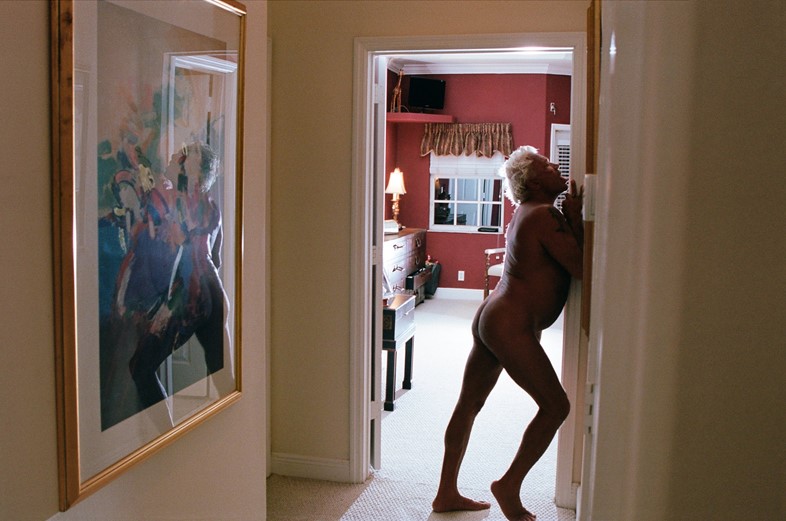
The pair’s artist-muse relationship has deepened in the years since they met. “Whenever I go down to Florida, I always make a little time to catch up with Frank,” Leifheit says. They keep in touch over email, and, when I ask what Frank thinks of the zine, Leifheit reads out a message he recently received. “Frank says: ‘I’m so happy for you. Very cool. I love this. Guess where I am …’ And he’s sent me pictures of himself, naked at the beach again.”
Frank by Matthew Leifheit is published by Pomegranate Press and is out now.
